Best
Beginner Euphonium
-
Overall: 9/10
-
Best Feature: Features a meticulously designed valve system
-
TedScore™: 9/10
Best
Baritone
-
Overall: 9/10
-
Best Feature: Fantastic intonation helps to build confidence
-
TedScore™: 9/10
Best
Marching Euphonium
-
Overall: 10/10
-
Best Feature: Rich and full sound quality, durability, and reliable performance
-
TedScore™: 10/10
Alright, you amazing brass lovers and band enthusiasts! Get ready for a hilarious, wild ride in the world of wind instruments, guided by your trusty expert, in this exciting and fun journey close to tuba territory!
Picture this: I’m stepping into the ring, armed with nothing but my wit and a couple of shiny brass contenders who are about to duke it out for the title of Supreme Brass Champion.
The euphonium is in the right corner, weighing in with curvy pipes and a bell that’s shinier than my third cousin’s bald head.

Don’t let that fancy name fool you; it might sound like a magical creature from a realm where unicorns are backup dancers, but this baby packs a melodious punch that could knock the socks off a hobbit.
And shimmying into the right corner, with a swagger that says, “I’ve got jazz hands, and I’m not afraid to use them,” is the baritone.
This smooth operator looks like it moonlights as a secret agent, whispering sweet nothings in a dimly lit, smoky jazz bar while sipping on a martini—shaken, not stirred, of course.
Sure, these two might look like long-lost twins at a family reunion, but trust me, they have differences that’ll make you sit up and pay attention faster than a squirrel at a nut festival.
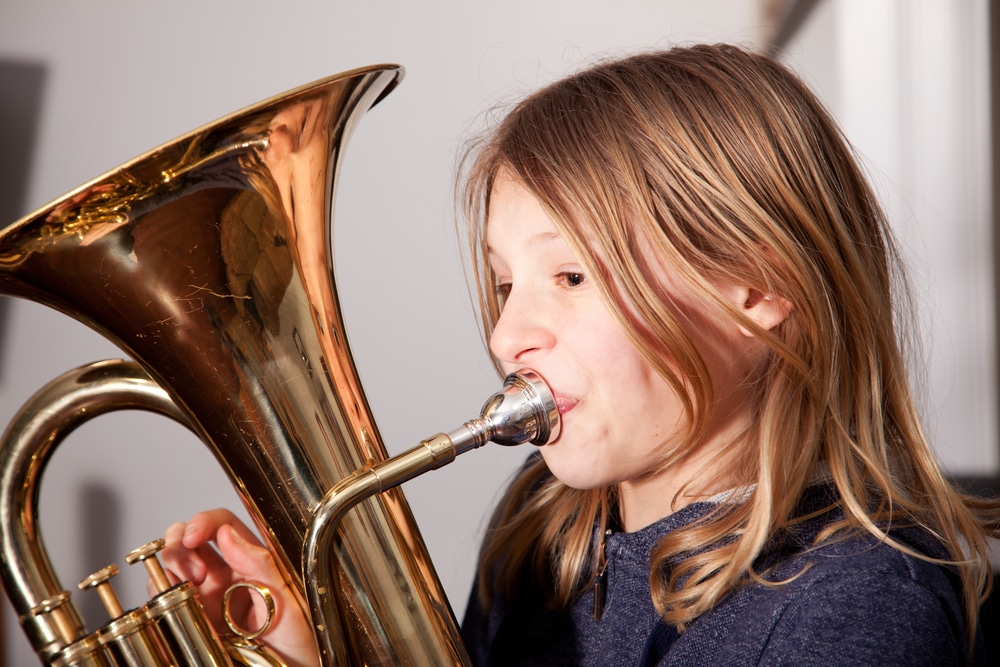
So, grab your front-row seat, clutch your pearls (or your tuba, no judgment here), and let’s dive headfirst into the musical rumble that is the euphonium vs baritone battle royale.
Spoiler alert: it’s going to be epic, educational, and possibly the most entertaining thing since someone figured out you could play “Flight of the Bumblebee” on a kazoo.
Let’s get ready to rumble!
Brief History Of Euphoniums And Baritones
The euphonium was developed in the mid-19th century and quickly became popular in brass bands and orchestras. It was designed to fill the gap between the tuba and the trombone, and it has a unique sound that’s both rich and mellow.
The euphonium has a conical bore, which means that the tubing gradually widens as it goes from the mouthpiece to the bell. This gives the euphonium its distinctive sound.
The baritone, on the other hand, was developed around the same time as the euphonium, but it was designed for a different purpose.
The baritone was initially intended to be a smaller, lighter version of the euphonium, and it was often used in military bands.
Unlike the euphonium, the baritone has a cylindrical bore, meaning the tubing is the same size throughout the instrument. This gives the baritone a brighter, more focused sound than the euphonium.
Over time, the euphonium and the baritone have evolved in different ways.
Today, the euphonium is often used in brass bands and orchestras, while the baritone is more commonly found in military bands and jazz ensembles.
However, both instruments are still popular and essential to the brass family.
Euphoniums vs Baritones: Appearance
Physical Characteristics
There are several differences regarding the physical characteristics of euphoniums and baritones.
Firstly, the euphonium is larger and more conical in shape, while the baritone is smaller and more cylindrical. This can be seen in the size and shape of their tubing and bells.
While each is shaped differently, both instruments are made with the same nine feet of tubing; as a result, they have identical tonal ranges.
Another physical difference between the two instruments is the position of their valves.
Baritones typically have their valves exposed over the top of the downtube leading to the bell. In contrast, euphoniums typically have valves placed underneath the topmost section of the main pipe.
Bell Size And Shape
One of the most noticeable differences between euphoniums and baritones is their bell size and shape.
The euphonium has a broader and gradually expanding bell, while the baritone has a narrower and more abrupt bell.
This bell shapes and size difference can impact the sound the instruments produce. Euphoniums produce a warmer and smoother sound, while baritones have a brighter and more focused tone.

Euphoniums vs Baritones: Sound
Tone Quality
The euphonium’s tone quality is often rich, mellow, and sonorous. It has various dynamics, from soft and gentle to loud and powerful.
On the other hand, the baritone has a brighter and more focused sound.
It often provides a brighter contrast to the euphonium’s warmer tone.
Range And Pitch
The euphonium has a larger range than the baritone, with a lower bottom note and a higher top note.
It can play notes in the bass clef and treble clef, making it a versatile instrument.
Conversely, the baritone is primarily a mid-range instrument with a limited range compared to the euphonium.
Regarding pitch, the euphonium is a non-transposing instrument, meaning that the notes it plays match the written music.
On the other hand, the baritone is a transposing instrument, meaning that the music is written in a different key than the notes it plays.
Euphoniums vs Baritones: Playing Technique
Fingerings And Valve Systems
The fingerings for the euphonium and baritone are similar, but some differences exist.
The euphonium has a fourth valve played with the left hand. This valve extends the range of the instrument downwards, allowing the player to play lower notes than are possible on the baritone horns.
The valve system on the euphonium is also slightly different to the baritone. The euphonium has a compensating system, which means that the fourth valve compensates for the intonation problems that can occur when combined with the first three valves.
This means that the player can play more accurately in tune on the euphonium than on the baritone.
Breath Control And Embouchure
The breath control required for the euphonium and baritone is different due to the differences in bore size.
The euphonium requires more air to produce a full sound, meaning the player must take larger breaths and control their breath more carefully.
The baritone requires less air, but the player must still control their breath carefully to produce a clear and consistent sound.

The embouchure required for the euphonium is more giant and more relaxed than the baritone. This is due to the larger bore size of the euphonium, which requires a larger amount of air to produce a full darker sound.
The player must use a more relaxed embouchure to allow for the larger amount of air to pass through the mouthpiece.
Euphoniums vs Baritones: Repertoire
Regarding repertoire, the baritone and euphonium have some similarities but also some differences.
Both instruments are commonly used in brass bands, wind ensembles, and orchestras. However, the euphonium is often used as a solo instrument, while the baritone is more commonly used in ensemble playing.
The euphonium has a rich and warm sound, which makes it well-suited for playing lyrical and expressive music.
On the other hand, the baritone has a brighter and more focused sound, making it ideal for playing more upbeat and rhythmic music.
Comparison Of Classical And Contemporary Music
Both the euphonium and baritone have a wide repertoire, from classical to contemporary music.
In classical music, the euphonium is often used in orchestral works and as a solo instrument in concertos.
The baritone is also used in orchestral works, but is more commonly used in brass bands and wind ensembles.
Both instruments are used in various genres in contemporary music, including jazz, pop, and rock.
The euphonium is often used in brass bands and jazz ensembles, while the baritone is commonly used in rock and pop bands.
Differences In Solo And Ensemble Repertoire
As mentioned earlier, the euphonium is often used as a solo instrument, and has a rich repertoire of solo works.
Some of the most famous composers of the euphonium include Joseph Horovitz, Philip Sparke, and James Curnow.
On the other hand, the baritone is more commonly used in ensemble playing and has a wide range of repertoire in brass bands and wind ensembles.
In terms of solo repertoire, the baritone has a smaller selection of works, but there are still some notable pieces, such as the “Concerto for Baritone” by Ralph Vaughan Williams.

Similarities Between Euphoniums And Baritones
Euphoniums and baritones are both brass instruments that produce sound when an instrumentalist blows wind into their mouthpieces.
They’re also low-pitched instruments that mainly produce B♭ notes.
Both were invented in the 1840s and are used in various music genres, including classical, jazz, and marching bands.
Similar Playing Techniques
Similarities In Sound And Range
Choosing Between Euphonium And Baritone
If you want to buy a brass instrument, you might wonder whether to choose a euphonium or a baritone.
Both are great instruments, but there are some differences to consider before purchasing. Here are some factors to consider when choosing between the two.
Factors To Consider When Choosing Between The Two
Range
Tone
Size and weight
Playing style
Personal preference:
Price And Availability
When it comes to price and availability, baritones are generally less expensive and easier to find than euphoniums. This is because euphoniums are less common and are often considered more advanced instruments.
However, if you’re willing to spend more money, you can find high-quality euphoniums worth the investment.
Popularity And Demand
Finally, you might want to consider the popularity and demand of each instrument.

While both instruments are popular, euphoniums are often featured in more solos and are preferred by most composers. If you plan on playing in an orchestra or a band, a euphonium might be a better choice.
However, if you’re looking for a more versatile instrument that can be used in various musical genres, a baritone might be a better option.
The Best Euphoniums
Yamaha YEP201 Student Euphonium, Gold

FEATURES: - Crisp, warm tone and balanced resistance throughout the range
- Carefully designed valve system
for perfect intonation
- Lighter weight model
- Tonal colours perfect for ensemble
and solo performances
- Includes a Yamaha mouthpiece and sturdy case
- Provides a free five-year extended warranty upon purchase
- The instrument's gold finish may be prone to scratches and wear
When you click ‘Check Price’, you’ll see there are loads of great places to buy this item. Our personal favorite is Sweetwater for the US, and Thomann and Gear4Music for the UK & Europe.
They are the largest music retailers, with excellent customer service, competitive prices, really fast shipping, and the longest guarantees.
The professional musician who wrote this article combined many things,
from the product build, manufacturer’s reputation through to feedback
from other users, to create our famous TedScore™.
Conn-Selmer 300EH Euphonium, Silver Plate with Trigger

FEATURES: - Features a professional style tuning trigger
- Glorious silver plate with a gold trim finish
-Lighter weight model
- Rose brass lead pipe produces a rich
and sonorous sound
- Includes a mouthpiece and lightweight cast with wheels
- The four-valve, fully compensating system is perfect for fast progression
- More expensive than some other intermediate-level euphoniums on the market
When you click ‘Check Price’, you’ll see there are loads of great places to buy this item. Our personal favorite is Sweetwater for the US, and Thomann and Gear4Music for the UK & Europe.
They are the largest music retailers, with excellent customer service, competitive prices, really fast shipping, and the longest guarantees.
The professional musician who wrote this article combined many things,
from the product build, manufacturer’s reputation through to feedback
from other users, to create our famous TedScore™.
Jupiter JEP1120 Performers Euphonium, Clear Lacquer

FEATURES: - The tone blends perfectly with a brass band
- Built using state-of-the-art technology
-Rose brass lead pipe produces a
warm and resonant tone
- Includes a hardshell case and mouthpiece
- Purposefully designed to suit top-level players
- Relatively heavy instrument
- Quite pricey for an intermediate-level instrument
When you click ‘Check Price’, you’ll see there are loads of great places to buy this item. Our personal favorite is Sweetwater for the US, and Thomann and Gear4Music for the UK & Europe.
They are the largest music retailers, with excellent customer service, competitive prices, really fast shipping, and the longest guarantees.
The professional musician who wrote this article combined many things,
from the product build, manufacturer’s reputation through to feedback
from other users, to create our famous TedScore™.
Elkhart 100EH Student 3 Valve Euphonium
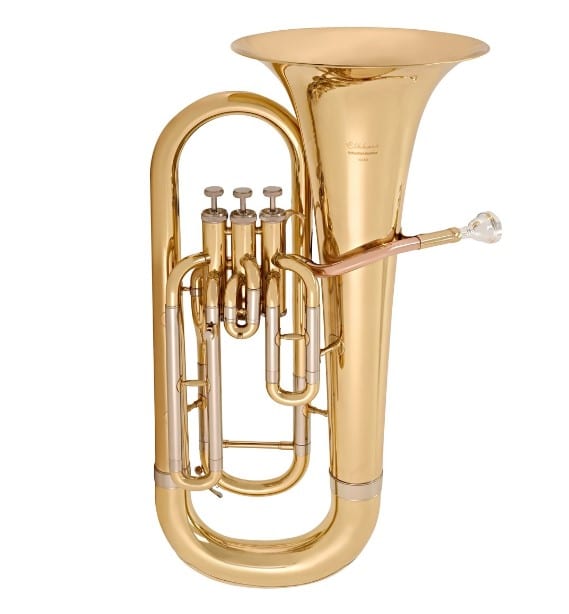
FEATURES:
Rose brass leadpipe produces a fantastic tone
- Designed by the famous Vincent Bach company
-Steel valves are light, smooth, and durable
- Includes backpack-style case and mouthpiece
- Perfectly suited for both schools and brass bands
- Some users reported that the sound quality is not as rich or full as higher-quality models
When you click ‘Check Price’, you’ll see there are loads of great places to buy this item. Our personal favorite is Sweetwater for the US, and Thomann and Gear4Music for the UK & Europe.
They are the largest music retailers, with excellent customer service, competitive prices, really fast shipping, and the longest guarantees.
The professional musician who wrote this article combined many things,
from the product build, manufacturer’s reputation through to feedback
from other users, to create our famous TedScore™.
King 1129 Ultimate Series Marching Bb Euphonium

FEATURES:
- Bb marching euphonium with a silver-plated finish and 4 top action valves
- Has an 11-inch bell and a .570-inch bore size for a more focused and compact sound
- Offers a rich and full sound quality, durability, and reliable performance
King 1129 Ultimate Series Marching Bb Euphonium
- Lightweight - easier to carry and play for extended periods
- Built with quality craftsmanship and advanced features
- Highly regarded by customers and professionals in the music industry
- Comes with a mouthpiece and a hard case, convenient for musicians on the go
- Higher price range
When you click ‘Check Price’, you’ll see there are loads of great places to buy this item. Our personal favorite is Sweetwater for the US, and Thomann and Gear4Music for the UK & Europe.
They are the largest music retailers, with excellent customer service, competitive prices, really fast shipping, and the longest guarantees.
The professional musician who wrote this article combined many things,
from the product build, manufacturer’s reputation through to feedback
from other users, to create our famous TedScore™.
Our Recommended Baritones
Yamaha YBH301 Intermediate Baritone Horn, Gold

FEATURES:
- Precise fit between valve casings and piston valves for a clear sound
- Original Yamaha wrap design is comfortable to play
- Includes Yamaha hard case and 45C2 mouthpiece
- Register for 5-year extended warranty and 3-months Tomplay Premium
- Higher price range for a beginner instrument
When you click ‘Check Price’, you’ll see there are loads of great places to buy this item. Our personal favorite is Sweetwater for the US, and Thomann and Gear4Music for the UK & Europe.
They are the largest music retailers, with excellent customer service, competitive prices, really fast shipping, and the longest guarantees.
The professional musician who wrote this article combined many things,
from the product build, manufacturer’s reputation through to feedback
from other users, to create our famous TedScore™.
Jupiter JBR700 Baritone Horn, Clear Lacquer
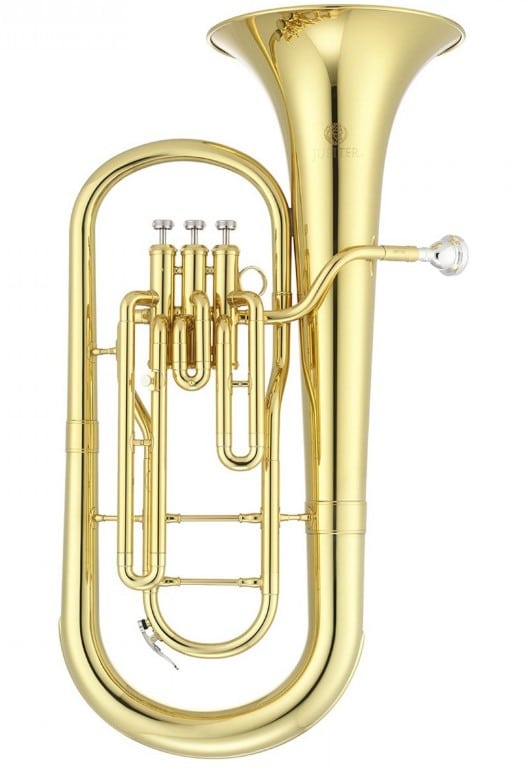
FEATURES:
- Ready to travel with an aluminium-frame light-weight case
-The outer slides on the horn are made from nickel silver
- Able to produce a yellow brass body that holds accurate tuning in all registers
- Fit in anywhere with a professional-looking lacquered brass body
- Built using state-of-the-art technology so you can relax with a well-built instrument
- Has a more limited range compared to some other baritones on the market
When you click ‘Check Price’, you’ll see there are loads of great places to buy this item. Our personal favorite is Sweetwater for the US, and Thomann and Gear4Music for the UK & Europe.
They are the largest music retailers, with excellent customer service, competitive prices, really fast shipping, and the longest guarantees.
The professional musician who wrote this article combined many things,
from the product build, manufacturer’s reputation through to feedback
from other users, to create our famous TedScore™.
Stagg BH235S Baritone Horn, Lacquer
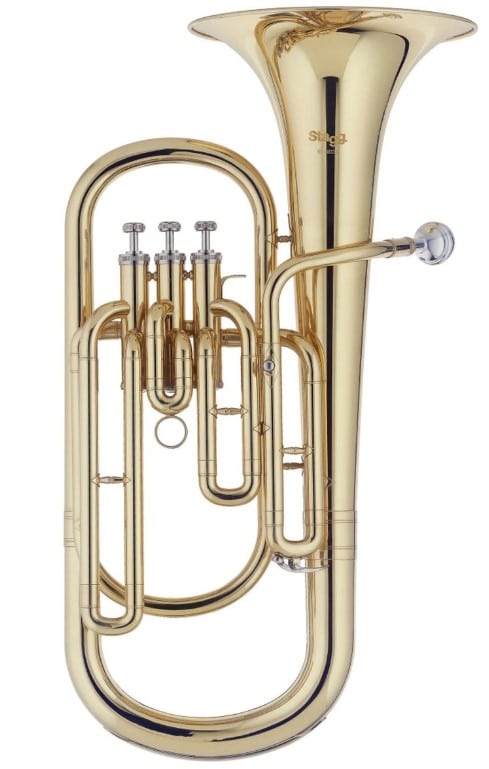
FEATURES:
- Steel valves are light, smooth, and durable
- Gorgeous clear lacquer finish
- Brass body and leadpipe produce a versatile tone
- Includes a backpack-style case and silver-plated mouthpiece
- Has a more limited range compared
When you click ‘Check Price’, you’ll see there are loads of great places to buy this item. Our personal favorite is Sweetwater for the US, and Thomann and Gear4Music for the UK & Europe.
They are the largest music retailers, with excellent customer service, competitive prices, really fast shipping, and the longest guarantees.
The professional musician who wrote this article combined many things,
from the product build, manufacturer’s reputation through to feedback
from other users, to create our famous TedScore™.
Besson BE157 Prodige Bb Baritone Horn, Silver Plated

FEATURES:
-Comfortable to play and easy to blow
- Fantastic intonation helps to build confidence
- Designed with advancing students in mind
- Includes mouthpiece and sturdy case
- Relatively heavy instrument, which may be a challenge for younger or smaller players
When you click ‘Check Price’, you’ll see there are loads of great places to buy this item. Our personal favorite is Sweetwater for the US, and Thomann and Gear4Music for the UK & Europe.
They are the largest music retailers, with excellent customer service, competitive prices, really fast shipping, and the longest guarantees.
The professional musician who wrote this article combined many things,
from the product build, manufacturer’s reputation through to feedback
from other users, to create our famous TedScore™.
Marching Baritone Horn by Gear4music

FEATURES:
-Lightweight construction for easy carrying during marching performances
- Durable brass body with a clear lacquer finish for a professional look and long-lasting performance
-Smooth-playing stainless steel valves for a responsive and precise playing experience
- Affordable price point compared to some other marching baritones on the market
- Comes with a sturdy hard case for added protection during transport and storage
- Limited range compared to some other baritones on the market
When you click ‘Check Price’, you’ll see there are loads of great places to buy this item. Our personal favorite is Sweetwater for the US, and Thomann and Gear4Music for the UK & Europe.
They are the largest music retailers, with excellent customer service, competitive prices, really fast shipping, and the longest guarantees.
The professional musician who wrote this article combined many things,
from the product build, manufacturer’s reputation through to feedback
from other users, to create our famous TedScore™.
Euphonium vs Baritone: A Recap
Summary
Well, my fine brass aficionados, you’ve stuck with me through the thick and thin of this tuba-esque saga, and now you’re practically experts on the subtle art of euphonium and baritone warfare.
But if you’re sitting there, scratching your head, still wondering which heavyweight champion to take home to mom, let me break it down for you one last time—with a twist of lemon and a dash of humor.
First off, let’s talk about you, yeah you—I see you there, pondering your musical destiny.
If you’re just dipping your toes into the brassy waters or you’re somewhere in the middle of the pool, doggy-paddling with the best of them, you might want to cosy up to a baritone. It’s like the friendly neighborhood dog that’s easy to walk.
But if you’re the kind of person who laughs in the face of danger and eats concertos for breakfast, then Euphonium horns, with its rich, chocolaty tones, might just be your soulmate.
Now, let’s get physical, physical—I’m talking size and shape, people! If you’ve got muscles that rival a Greek god, or you just like to show off at the gym, then by all means, hoist a euphonium on your shoulder and prepare for battle.
But if you’re the type to take your brass buddy on the road, serenading strangers and wooing cats, then the sleeker, more travel-friendly baritone is your ticket to ride.
And then there’s the moolah, the dough, the big bucks. If your piggy bank is full to bursting, and you fancy the finer things in life, then go ahead and splurge on a euphonium. But if you’re saving up for a rainy day or that diamond-encrusted mouthpiece, then the baritone is your budget-friendly beau.
The grand finale?
Take those brass beasts for a spin! Tickle their valves, blow some notes, and see which one makes your heart sing and your toes tap. There’s nothing like a personal serenade to know if it’s true love.
Remember, folks, whether you swing to the sultry sounds of the euphonium or you bop to the bold beats of the baritone, you’re in for a treat. Each instrument is a gem, sparkling with its own personality, ready to join you in making the world a groovier place. So, strap on your mouthpiece, and let’s make some noise!
Before you go…
If you want to learn more about the other brass instruments, get ready to blow your mind with this Tuba Buying Guide!
We’ll look at the different types of tubas available and help you decide which one will make you the coolest kid in the band!
FAQ's
Euphonium and baritone are very similar instruments, and their difficulty level may depend on the individual player’s experience and skill level.
A baritone player can play the euphonium as they are very similar instruments and use the same fingerings and techniques.
However, the euphonium’s larger size and different mouthpiece may require some adjustment in terms of breath support and embouchure.
The euphonium and baritone are two different instruments, but they’re often confused with each other due to their similar appearance and sound.
The euphonium is larger than the baritone and has a conical bore, while the baritone has a cylindrical bore.
No, a euphonium is not a tiny tuba. While they are both brass instruments and have a similar shape, the euphonium is smaller than a tuba and has a different range and tone.
The euphonium is also a member of the saxhorn family, while the tuba is part of the ophicleide family.



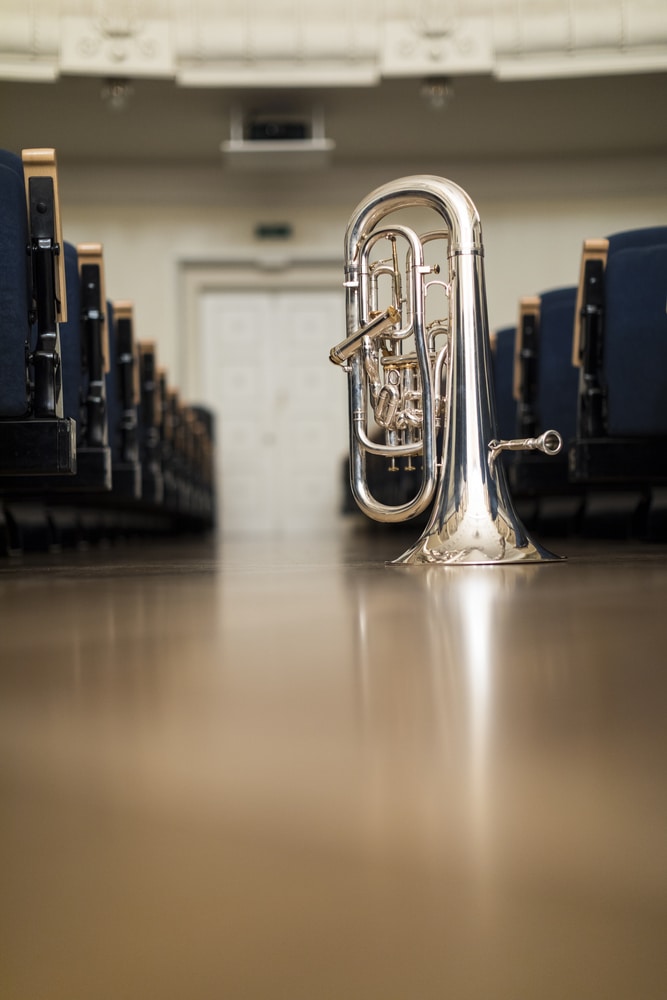









The segment discussing the repertoire for euphoniums and baritones was particularly illuminating. However, I noticed a small oversight regarding contemporary classical music compositions for the euphonium which have significantly increased over the past decade. It would be beneficial for readers to understand that contemporary composers are now writing more extensively for both instruments, thereby expanding their solo and ensemble repertoire beyond traditional boundaries.
This was super helpful! I’ve been part of my school’s band playing the baritone, but I’ve always been curious about the euphonium. The details on playing technique and sound differences are just what I needed. Thanks for making this easy to understand!
Right? The comparison really puts things into perspective. Makes me wanna try euphonium too.
Loved the bit on Euphonium vs Baritone, but y’all left out the most crucial point. Which one makes for a better umbrella stand during rainy season rehearsals? Asking for a friend.
Carl, really dig the comprehensive breakdown between the euphoniums and baritones. I’ve been on the fence for a while about which one I should be investing more time (and potentially money) into. Given both have their unique charm and sound, how would you recommend someone like me to make a choice? Is it more about the kind of music I wanna play, or is there a significant learning curve difference between the two? Cheers!